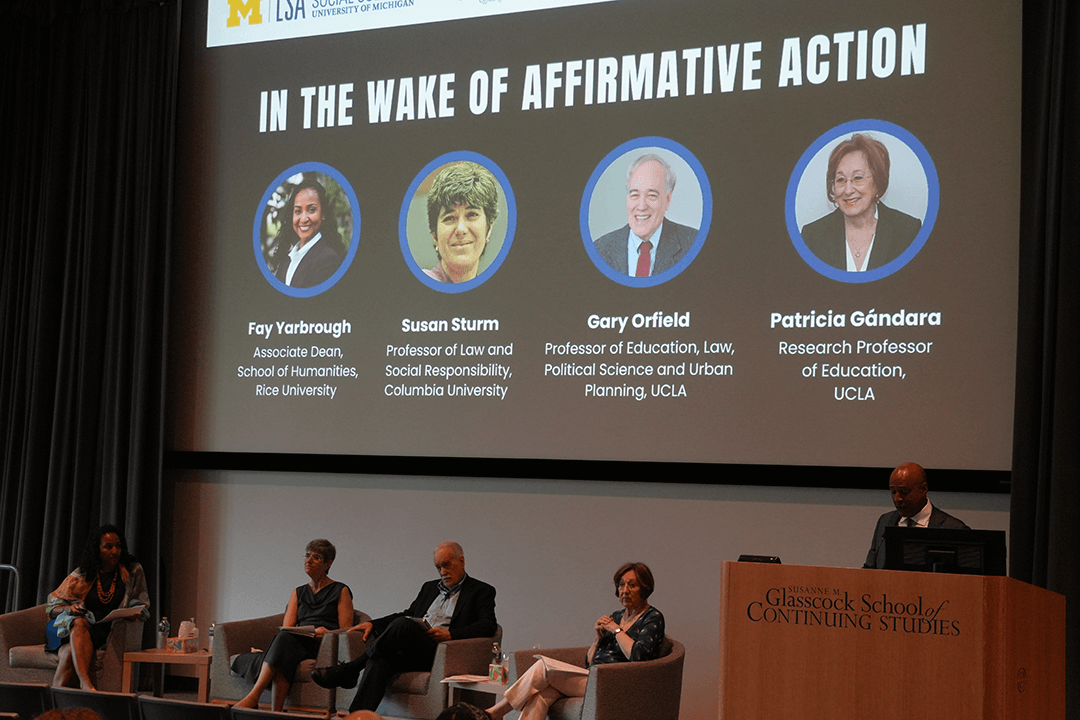
“We are a long way from where we need to be,” Gary Orfield told the crowd gathered to learn about and discuss the impact of the U.S. Supreme Court reversing its stance on affirmative action.
The professor of education, law, political science and urban planning at the University of California, Los Angeles was one of three researchers and higher education leaders invited to participate in a June 18 panel discussion at Rice University titled “In the Wake of Affirmative Action.” Patricia Gándara, research professor of education at UCLA, and Susan Sturm, professor of law and social responsibility at Columbia University, joined Orfield to hash out the implications of the ruling and the future of college access for traditionally marginalized communities.
“Tonight’s topic is weighing heavily on the minds of people like me who are deeply invested in making higher education accessible to everyone,” Rice President Reginald DesRoches said in his opening remarks. “Rice and many other universities across the country are at the cusp of matriculating their first class since the Supreme Court’s ruling last summer that prevents universities from considering an applicant’s race as one of countless factors in the admissions application.”

DesRoches, who called universities the “most powerful engines of equality and opportunity in America,” highlighted Rice’s progress over the decades, noting that the institution’s demographic landscape has significantly diversified.
“Last year’s matriculating class, for example, had no single ethnic or racial majority, and 32% of our students were from underrepresented groups, and another 13% were international students,” DesRoches said, noting that the shift is a testament to decades of efforts made by universities to embrace diversity and inclusivity.
Earl Lewis, founding director of the Center for Social Solutions at the University of Michigan, explained that the “Our Compelling Interests” book series, published by Princeton University Press, was started after the realization that too few people understood the value of diversity in democracy. It has resulted in four volumes being published with a fifth forthcoming this fall and a sixth expected next spring.
“Diversity and democracy in our view is related to the whole idea of a prosperous society,” Lewis said. “We can define it, we can leverage it, but in more and more sectors of American life and society, we may not be valuing the importance of diversity.”
Moderated by Fay Yarbrough, associate dean of humanities for faculty and graduate programs and history professor at Rice, the evening’s discussion centered on the value of affirmative action and how educational institutions can ensure diversity in their student populations without it.

“Affirmative action is very important because there was almost no diversity in higher education until affirmative action came along,” Orfield said, criticizing the Supreme Court’s ruling and pointing out that the majority opinion ignored the educational benefits of diverse classrooms. “There was no discussion in the majority opinion about what the effects will be. [The justices] weren’t interested in that information.”
Admissions offices at many universities rely heavily on SAT and ACT scores, which Gándara said only highlights the persistent inequalities in the education system.
“At bottom, test results reflect the education that we provide the students,” Gándara said. “That education is grossly unequal from preschool to high school. Until we fix that problem, test scores of whatever tests of all kinds will reflect that inequality. Until we disentangle test scores from the notion of merit, we will be stymied in our efforts.”
She noted that removing test scores from admissions criteria at UCLA led to a historic increase in applications from students of color, suggesting that traditional metrics like standardized tests may discourage potential applicants from marginalized communities.
“The tests create a situation where students see themselves as less able and therefore taking themselves out of the game,” Gándara said.
Sturm proposed a proactive approach to fostering equity within educational institutions, advocating for the creation of “microspaces of justice” and “microspaces of democracy” within universities, where transformative changes can take root and spread.
“How do we build people within higher education and within our own institutions that will take that kind of responsibility, either protesting or taking up leadership at our institutions?” Sturm asked. “I think part of what we need to do is change the way we structure power within the classroom so that people start taking responsibility earlier on for their own education, so they’re not passive.”
Sturm also emphasized the importance of integrating discussions about race and race’s impacts in all areas of education and societal concern.
“I think our fate as a nation, as a world, is dependent on our understanding of how issues of race really affect all of us,” Sturm said.
The panel discussion was co-sponsored by Rice’s Office of Diversity, Equity and Inclusion and Michigan’s Center for Social Solutions.

